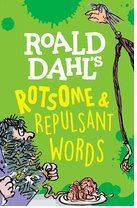
We all remember picking up a dictionary as a child and surreptitiously looking up that rude word you heard in the playground, but now Oxford University Press (OUP) will publish the first collection of cheeky words that parents will love too: Roald Dahl’s Rotsome & Repulsant Words, on World Book Day, Thursday 7th March 2019.
Naughty words have been making their way into dictionaries since the eighteenth century, and even Samuel Johnson (who omitted most of them) permitted bum to appear in his Dictionary of the English Language in 1755, quoting its use in Shakespeare. The story goes that after one reader commended him for not including improper words, Johnson replied: ‘No, Madam. I find, however that you have been looking for them.’
OUP has been the home of dictionaries for centuries and its iconic Oxford English Dictionary aims to record every word in the English Language, rude or not. But now, for the first time, OUP has gathered together the cheekiest words used by the world’s number one storyteller, Roald Dahl, in a guide for children unlike any you’ve seen before.
Roald Dahl made up more rude words than any other children’s writer and his stories are full of colourful insults and creative putdowns, which will make children (and parents) giggle (or as he would say griggle). Unlike most adults, who only use a handful of rude words over and over again (and tend to develop favourites), Dahl loved playing with language to create a whole world of rotsome and repulsant words. In this new collection, hundreds of real words, and Dahl’s invented words (called ‘gobblefunk’), have been researched, analysed and explained by lexicographer Dr Susan Rennie, accompanied by illustrations by Sir Quentin Blake.
Rennie says: ‘Roald Dahl’s sense of mischief is nowhere more evident than in the wicked humour of his language. He knew instinctively what would make children griggle, and even his nastiest characters use wickedly funny insults and made-up curse words that are fun to say aloud, but never cross the line into being truly offensive. Children can also learn a lot from Dahl about how words are constructed and how meanings change over time. By bringing together some of his most reduculous words, we hope the book will be a fun introduction to the fascinating world of words and will inspire children to be as creative with language as Roald Dahl himself.’
Roald Dahl employed a range of linguistic devices to create his own rude words, including onomatopoeia (whizzpopper) and spoonerisms (rommytot). In Roald Dahl’s Rotsome & Repulsant Words, we discover that invented rude words are often hard to distinguish from real words, with the real words codswollop and slubberdegullion sounding just as ridiculous as Dahl’s made up crodswoggle and slushbungle. Dahl’s characters also master the art of using language to make real words sound ruder, like in Matilda, when Miss Trunchbull uses alliteration to great effect with insults such as ‘you fleabitten fungus’!
Roald Dahl’s Rotsome & Repulsant Words also shows how the meaning of words to describe rudeness has changed over time. Naughty is related to the word nought and originally meant ‘very poor’ and only later came to mean ‘wicked’ and then ‘badly behaved’. In the Middle Ages silly meant ‘very good or worthy’ and was also used as a surname, whereas nice originally meant ‘silly or foolish’. The word bottom (in the anatomical sense) now seems very mild, but was considered quite rude a century ago (and surprisingly, is not as old as bum). The book also introduces some insulting terms from hundreds of years ago that have fallen out of use including bescumber (to poo upon), dunderhead (very stupid person) and slubberdegullion (someone very sloppy and messy).
For centuries, we have used words from other languages to insult each other, so people wouldn’t know what we were really saying. Roald Dahl is no exception and in one of his stories, Willy Wonka pretends to speak Martian so that he can say YUBEE LUNI to the President of the United States. Roald Dahl’s books have been published in 63 languages globally, but how have his invented rude words been translated? Well, giants curse in German by saying beschwipsduselt, and Spanish ones say furripanchoso. The disgusting snozzcumber becomes a kotzgurke in German (meaning ‘sickable cucumber’) and a feechcumber in Scots (meaning ‘yuck-cumber’).
Roald Dahl also loved discovering the origins of words, and Roald Dahl’s Rotsome & Repulsant Words highlights some surprising stories behind the words we use. For example, bunkum is based on a place called Buncombe in North America, which once had a politician who wouldn’t stop talking, and poppycock comes from Dutch pappekak, which literally means ‘soft poo’.
Roald Dahl understood the immense power that language and humour have to cut people down to size and the children in his books often use language to stand up to beastly adults. In a world where ludicrous things are being done by grown ups, children can use their knowledge and imagination to poke fun at the adults in power, just as Willy Wonka did to the President.
Helen Freeman, Director of Publishing Operations and Home Sector at OUP said: “OUP’s ongoing research into children’s language shows the incredible influence Roald Dahl continues to have on children’s vocabulary and writing and we couldn’t be more excited to publish this splendiferous book with the Roald Dahl Story Company. Children will love foxing grown-ups with Roald Dahl’s anarchic words, while discovering etymologies, definitions, and fascinating language facts along the way.”
Roald Dahl’s Rotsome & Repulsant Words is published on 7 March 2019 by Oxford University Press, at £5.99.


